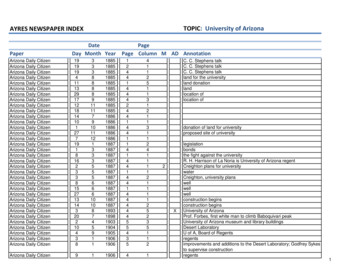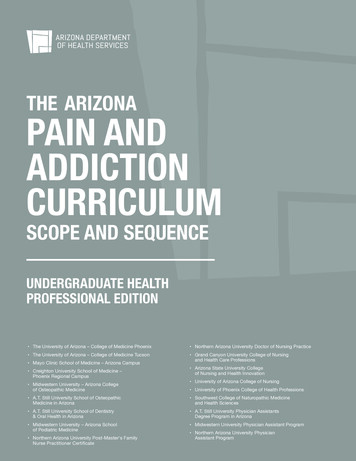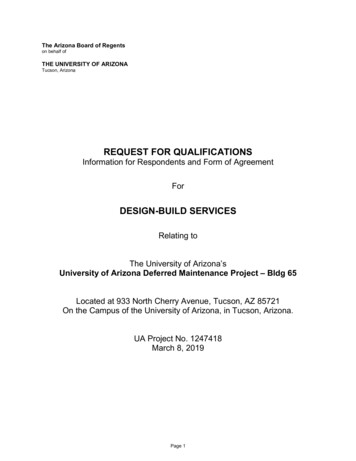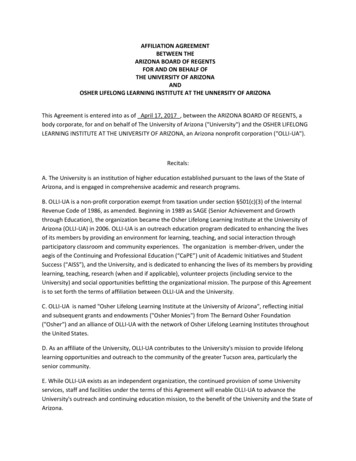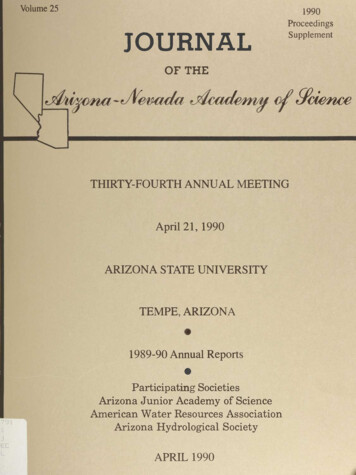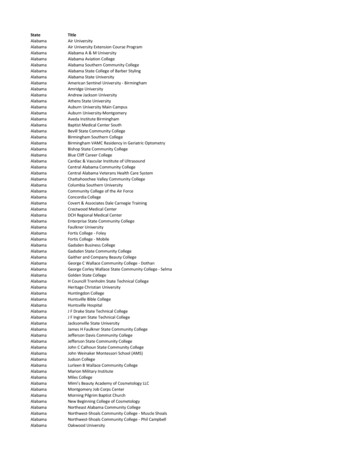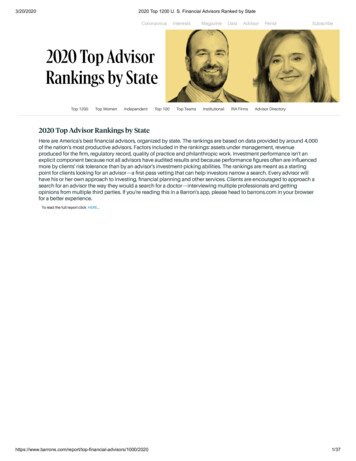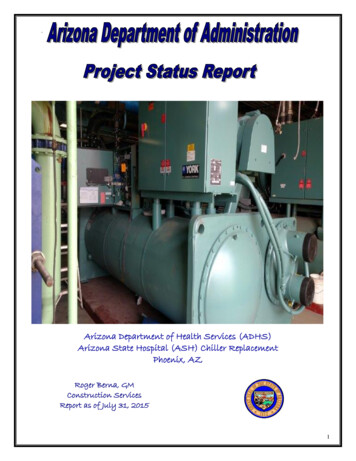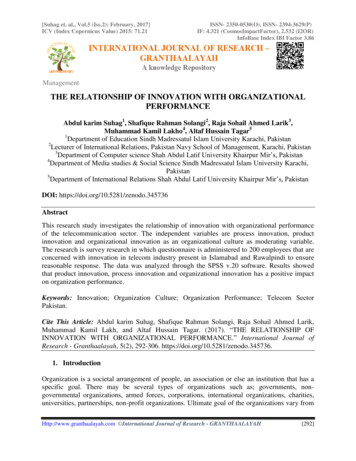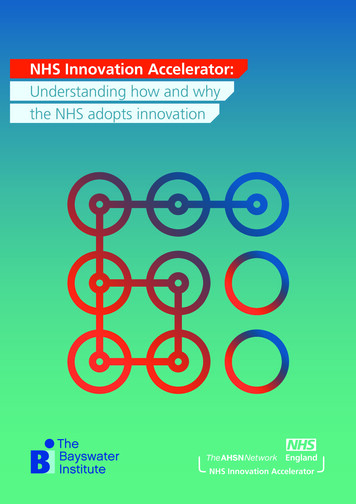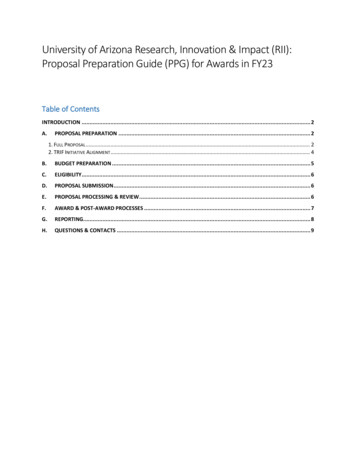
Transcription
University of Arizona Research, Innovation & Impact (RII):Proposal Preparation Guide (PPG) for Awards in FY23Table of ContentsINTRODUCTION . 2A.PROPOSAL PREPARATION . 21. FULL PROPOSAL . 22. TRIF INITIATIVE ALIGNMENT . 4B.BUDGET PREPARATION . 5C.ELIGIBILITY. 6D.PROPOSAL SUBMISSION . 6E.PROPOSAL PROCESSING & REVIEW . 6F.AWARD & POST-AWARD PROCESSES . 7G.REPORTING. 8H.QUESTIONS & CONTACTS . 9
UArizona Research, Innovation & Impact (RII)Spring 2022 — Proposal Preparation Guide (PPG) for Awards in FY23IntroductionResearch, Innovation & Impact (RII) supports all levels of staged research development throughResearch Development Grants. Research Development Grants are intended to provide a pathway tosuccess for research and scholarship with the goal of accelerating project competitiveness prior toextramural proposal submission. Applicants should use these grants to develop research, scholarly, orcreative activity in preparation for extramural funding, and should prioritize submission to the singlemost relevant Research Development Grant competition in a given funding cycle.Research Development Grants should support multiple of the following initiatives or concepts:1. Implementation of the UArizona Strategic Plan or UAHS Strategic Plan with a focus on Pillar 2:Grand Challenges (although well-developed research opportunities that support the otherPillars are welcome)2. Advancement of graduate and particularly undergraduate research opportunities (inclusion ofundergraduates in research are prioritized)3. Advancement of TRIF Initiative priority areas (see section A.2)4. Inclusion and promotion of justice, equity, diversity, and inclusion (JEDI) in researchResearch Development Grants are not intended to provide bridge funding, rather to launch a newresearch program of inquiry. If you are interested in or require bridge funding, please consult first withyour department head. All Research Development Grant awards are dependent upon review andavailability of funds. Failure to meet the Award or Reporting expectations described below results inineligibility for receipt of subsequent funding from RII.This Proposal Preparation Guide (PPG) provides information and guidance on the full lifecycle ofResearch Development Grants. If an individual solicitation differs from the PPG, the guidelines providedin the solicitation (available on the Research website) supersede those of the PPG.A. Proposal PreparationAll documents must have 1” margins, and no smaller than 11 pt. font. The following are acceptablefonts: Arial, Times New Roman, Calibri, or Tahoma. Reduced font sizes in figures and legends areacceptable although font sizes should be legible.Reducing margins or font size will result in administrative return without review. If a proposal isreturned without review, the PI must wait until the next funding cycle to resubmit.All documents, except the budget sheet, must be saved and uploaded as PDF files. Please avoiduploading any PDFs as Adobe Portfolios, these do not work for InfoReady export. The budget sheetshould be uploaded as an editable Excel document.1. Full ProposalEach of the Research Development Grants require the following sections: Cover Sheet, ProposalNarrative, and Required Supplemental Documents. As a reminder, should there be deviances betweenthe PPG and the solicitation on the Research website, the Research website supersedes this PPG.Full Proposal Sections (including step-by-step upload into the submission system):PPG v7pg. 2Applicable as of 3/2/22
UArizona Research, Innovation & Impact (RII)Spring 2022 — Proposal Preparation Guide (PPG) for Awards in FY23a) Cover Sheet: The following information will be copied into text boxes within the system. Specialcharacters are discouraged.i) Principal Investigator: Name, Department, College, Rank, Contact Informationii) Co-Investigators (up to four Co-Is may be listed): Name, Department, College, Rank, ContactInformationiii) Business Officer, Research Administrator, or Similar: Name and Contact Informationiv) Proposal Summary: Include a 200-word summary of your proposal. A self-containeddescription of the proposed work and outcomes that would result if funded. Include thesignificance and potential impacts of the proposed work. This should be understandable to ascientifically or technically literate lay reader.v) Proposed Extramural Mechanism: 200-word limit. Include the targeted solicitation (includingfunding level and deadline) and/or sponsor. If you do not have a solicitation, discuss fit tothe potential sponsor.vi) Keywords/Key phrases: Include up to five keywords or key phrases.vii) Proposal Specific Sections:(1) Select a Track, if applicable(2) Identification of relevant compliance areas including human subjects, animal research,inclusion of Native Americans or international indigenous groups in the proposal, etc.(3) Budget amount requested (round up to the nearest dollar)(4) Identification of primary TRIF initiative (see below for details) or select “none”(5) Identification of Co-Reviewed TRIF initiative(6) Review Panel Selection (select primary and secondary, if applicable): Clinical, Life, andBiomedical Sciences; Physical, Data, and Earth Sciences; Engineering, Space, and OpticalSciences; Social Sciences and Humanities; Artsb) Proposal Narrative: The proposal narrative is limited to two-pages. The narrative should includethe following sections:i) Brief description of the specific aims or objectivesii) Significance; expected outcomes; and relationship to priority areas 1 through 4 (asapplicable) from the Introduction.iii) Approachiv) Brief description as to why the PI and/or team is uniquely positioned to be competitive andhow the RII grant will increase competitivenessc) Required Supplemental Documentsi) References cited (no more than one-page) using the discipline-specific reference standard,i.e., the reference style you would use when submitting a journal article in your fieldii) PI’s CV or agency-specific biographical sketch(1) NIH biographical sketches are exempt from the 1” margin requirements as detailedabove and may be a maximum of five-pages per NIH guidance(2) CVs should be no longer than two-pagesiii) Budget and budget justification using the budget template provided in the submissionsoftwareiv) Confirmation from the appropriate research administrator that your budget has beenreviewed and is correct at the time of submission. “The appropriate research administrator”is the individual that would normally approve and route your budget to Sponsored Projects& Contracting Services for submission to the external sponsor. For this confirmation, anemail PDF is acceptable if the email includes the total dollar amount requested.d) Supplemental Documents, if ApplicablePPG v7pg. 3Applicable as of 3/2/22
UArizona Research, Innovation & Impact (RII)Spring 2022 — Proposal Preparation Guide (PPG) for Awards in FY23(1) Up to four Co-Is CV(s) or agency-specific biographical sketch(es), proposal formattingand limitations described above in PI CV section apply.(2) Letters of Collaboration (from unfunded research collaborators, including allinternational collaborators).(3) Letters of Support, including in-kind support or match, i.e., letters committing financialresources.(a) Dean’s, Department Head, or Director’s letters are only required if there is someform of institutional commitment associated with the proposal. Commitment isdefined as resources that would otherwise not be available to you, e.g., additionalfunds for travel, in-kind support from existing personnel, etc.(b) If there is a collaborating institution, a letter of support indicating the institutionalcommitment of the collaborating institution must be provided. That is,collaborating institutions must provide support for their faculty, this letter shoulddocument that support (see Budget Preparation section for additional informationon allowable costs).(4) Resubmission Statement: If your Research Development Grant proposal requests fundsto enhance the competitiveness of a recently declined extramural proposal, include aone-page (maximum) description of how you plan to address the reviewer comments.Attach this statement to the reviewer comments (e.g., NIH Summary Statement or NSFPanel Summary) and upload as one PDF document.(5) If you have an existing protocol, upload a PDF of your current approval letter only (notthe full protocol) related to human subjects or animal research. Any items proposed inthe grant that do not fall under the approval will be submitted as an amendment uponaward recommendation. Note that all funded proposals are expected to comply withapplicable institutional research policies, including but not limited to, human subjects,animal research, conflict of interest, HIPAA, export control, and laboratory safety.The following document templates are provided: Budget Form – Microsoft Excel Proposal Narrative – Microsoft Word2. TRIF Initiative AlignmentIn November 2000, Arizona voters made a 20-year commitment to stimulate innovation and researchand to support Arizona’s knowledge-based economy. The landmark passage of Proposition 301, a 0.6%sales tax to be used for education in Arizona, included a new University-directed funding source, theTechnology and Research Initiative Fund (TRIF), which has been used to catalyze research andtechnology transfer at Arizona’s academic institutions. Additionally, TRIF seeks to expand access tobaccalaureate or post baccalaureate education. 2021 marked the start of a reauthorized TRIF cycle. Atthis time, the TRIF cycle is annual and as such, proposals funded under the TRIF initiative must becompleted by June 30, 2023.If the proposal aligns with a TRIF initiative, applicants must select the most applicable initiative duringproposal submission. If proposals align with two TRIF initiatives, applicants will have the option to selecttwo initiatives. TRIF initiative options include:1. Improving Health2. Water, Environmental, and Energy Solutions3. National Security SystemsPPG v7pg. 4Applicable as of 3/2/22
UArizona Research, Innovation & Impact (RII)Spring 2022 — Proposal Preparation Guide (PPG) for Awards in FY234. Space Exploration and Optical Sciences5. Access and Workforce Development6. Innovative Tech for the 4th Industrial RevolutionFor the most recent Arizona Board of Regents (ABOR) TRIF Annual Report visit the ABOR site.B. Budget PreparationResearch Development Grants are intended for UA-related research expenditures. Awards may not beused to replace current sources of support for personnel. No Research Development Grant funds maybe used for salaries for personnel from other institutions.If there is a collaborating institution, the proposal must indicate, through letters of support (i.e.,institutional commitment), a summary of the commitments that the collaborating institution is makingtoward the proposed effort.The following provides a list of generally allowable costs: Short-term hourly student wages and associated ERE Research technical staff, including graduate students, and associated ERE and tuition and fees(when applicable) Honoraria or participant stipends Meeting costs, e.g., room rentals, meals/breaks, etc. Supplies, including research supplies and/or items such as musical scores and art supplies Domestic travel (international travel funding is only available in very well justified cases or aspart of the International Research Grant program) Specialized equipment (capital and other) pertaining specifically to the project Proposal support e.g., graphic design, speaking coaches (for site visits), etc. above and beyondwhat is currently offered by RII Consultants may be used in very limited, exceptional, and well-justified cases. Extremely well-justified release for faculty with a greater than 2:2 teaching load OR facultypursuing large/complex research efforts (this requires a letter of support from your departmenthead and should be used judiciously). Please note that we cannot utilize TRIF funds for teachingrelease, as such releases are provided through alternative funding sources. Hence the criteriafor extremely well-justified cases.In addition to direct cost items mentioned above, RII Core Facilities use credits may be requested.RII may request that proposal budgets are revised prior to award. This includes potential revisions to thetotal award amount. Generally, if a budget amount is reduced a reduction in scope will also occur.In general, Research Development Grants should not be used to supplement existing faculty start-up.Applicants with significant start up may apply in very well justified cases and must explain how access toResearch Development Grants will enable new, interdisciplinary discovery or a proposal with significantreturn on investment.PPG v7pg. 5Applicable as of 3/2/22
UArizona Research, Innovation & Impact (RII)Spring 2022 — Proposal Preparation Guide (PPG) for Awards in FY23C. EligibilityEach of the Research Development Grants are open to University of Arizona eligible PrincipalInvestigators/Project Directors/Co-Principal Investigators (hereafter called “PI designation”). For moreinformation on whether you meet the PI designation, please visit the Research site. Please note that ingeneral, Research Development Grants are designed for Tenured/Tenure Eligible Faculty;Continuing/Continuing Eligible; Career Track; and Research Scientists (only these four categories ofeligible investigators can apply for TRIF funds).Postdoctoral Fellows are advised to seek funding through the Postdoctoral Research & DevelopmentGrants sponsored by the Office of Postdoctoral Affairs.For Research Development Grants promoting interdisciplinary and transdisciplinary research, successfulapplicants will include PI/Co-PI teams from multiple departments and generally, multiple colleges.The purpose of these awards is to encourage developing research projects for extramural grant funding.As such, applicants are only eligible to receive one award per cycle as PI and one award per cycle as Co-I.Choose judiciously and prioritize submission to the most applicable competition for a given fundingneed. Prospective Applicants who have not fulfilled Final Progress Report and Review ServiceCommitments (per the RII Project Funding Agreement) are at a competitive disadvantage until theserequirements are complete.D. Proposal SubmissionProposals must be submitted through UA Competition Space by 5:00 pm no later than the deadlineslisted on the solicitation page.It is strongly suggested that applicants complete and submit their application much earlier than 5:00pm as the system will not accept applications after the deadline. There have been instances ofapplication failure when submitting minutes prior to the 5:00 pm deadline. To ensure successfulsubmission, RII recommends submitting your proposal no later than noon on the deadline date.Applications that do not meet the submission deadline will not be accepted. There are no exceptions,please plan accordingly.Proposals must be linked to the PI’s name and official UArizona email address. PIs may designate anindividual, such as a research administrator, to proxy in the proposal materials. Information onsubmitting proposals by proxy is available in the “Help” section of the submission website. Please do notsimply have the proxy submit in your name. Instead, follow the steps to give proxy. Failure to do so cancause UA Competition Space to not accept your submission. If you have questions, emailresdev@arizona.edu.RII Research Development Grants do not require UAccess Research routing or UArizona SponsoredProjects & Contracting Services approval prior to submission. However, all proposals requiredocumentation from the appropriate research administrator (see A.1.c.v).E. Proposal Processing & ReviewProposers should allow up to three months for proposal processing, review, and notification.PPG v7pg. 6Applicable as of 3/2/22
UArizona Research, Innovation & Impact (RII)Spring 2022 — Proposal Preparation Guide (PPG) for Awards in FY23Submitted proposals will first undergo a compliance check that includes confirmation of all requireddocuments, page-limit and formatting compliance, and confirmation that the budget is allowable andwithin the amount specified for the solicitation. Once the proposal is reviewed as compliant it entersmerit review. At this stage, applicants will only be notified if their proposal will be returned withoutreview.Review is conducted by UArizona faculty and qualified staff. PIs should write proposals that are jargonfree and understandable to an interdisciplinary audience. The following criteria will be considered: Overall Impact & Significance: Evidence of the project to address identified gaps inknowledge, initiate new research or scholarly activity, and how the project will explorenovel, creative, or potentially transformative concepts Fit to FY Research Priorities: see the Introduction, items 1-4 Budget & Return on Investment: Fit and reasonableness of the budget to the scope as wellas the feasibility of the plan to pursue external funding and the likelihood of a competitiveproposal Investigator/Research Team: Qualifications and expertise of the investigator or researchteam to conduct the proposed research, creative, or scholarly activity. If applicable, thehistory of successful collaborations by the proposing teamSelection will be based first on the outcome of the merit review, including alignment with institutionalpriorities. Where applicable, alignment of proposals with UA’s TRIF plan will be considered.Conflict of Interest (COI) and Confidentiality: All information contained in a grant application andassociated supplemental documents are considered highly confidential and all efforts will be made toensure the fair, objective, and confidential review of each proposal. Reviewers will be required to sign aCOI statement prior to proposal assignment and review and to adhere to strict guidelines to ensure theconfidentiality of the content of all grant applications as well as any information conferred during theensuing panel discussions. Generally, any prior collaborations, mentorship roles, and/or departmental,financial, and familial conflicts are considered COIs. During panel discussion, conflicted reviewers will berecused and released during the dialogue regarding the proposal with which s/he has an apparent orperceived COI.F. Award & Post-Award ProcessesThe PIs of all proposals, whether awarded or declined, will receive a notification. Award notification willbe sent to PIs, heads/directors, deans, and business offices. Reviewer comments will be sent only to thePI (or designated proxy in the system). After funding decisions have been made (approximately threemonths after the submission deadline) note that it can often take up to one week to send allnotifications.Once notifications are sent, PIs and their business offices will receive a Project Funding Agreement fromthe appropriate business administrator (see section H. below). This initiates the account setup andtransfer of funds.Upon award, the PI must comply with all applicable institutional research policies, including but notlimited to, those related to research with human subjects, animal research, conflict of interest, HIPAA,export control, and laboratory safety.PPG v7pg. 7Applicable as of 3/2/22
UArizona Research, Innovation & Impact (RII)Spring 2022 — Proposal Preparation Guide (PPG) for Awards in FY23RII Research Development Grant awards must be leveraged to acquire external support for theproposed research or scholarly activity. It is expected that recipients: Prepare at least one proposal for an external grant during the award period, and Serve as a reviewer on at least two RII competitions over a three-year period.Awards span the 2023 fiscal year, July 31, 2022, through June 30, 2023. Workshop grants have a ninemonth award cycle, equipment grants must be expended in the Fiscal Year in which they are awarded.Multi-year projects are unavailable.While RII recognizes that the original project scope may change, in general, no-cost extensions are notpermitted. If, under extenuating circumstances, a no-cost extension is required, the PI must providesufficient documentation justifying the request. A request merely for the purpose of using unliquidatedbalances is not considered sufficient justification. Changes to the budget must be well justified; contactthe appropriate budget administrator (listed below) for additional information.G. ReportingFailure to meet the Award or Reporting expectations described here results in ineligibility for receipt ofsubsequent funding from RII.Final reports are due within one month of the award’s end date. PIs must submit final reports via UACompetition Space. Final reports are submitted via textbox, and therefore, special characters arediscouraged. If you require the use of special characters, please contact us. Multi-year projects arerequired to submit annual progress reports with similar information. Reporting requirements includethe following: Start & End Dates of Funding Project Title Outcomes: 750 words. A statement on the research findings, creative or scholarly activitycompleted. List of Submitted Proposals: 500 words. Include the following information: proposal title, funder,program name, solicitation number, UAccess Research document number (if applicable),requested amount, and status. If you have not completed a proposal, enter “N/A” and you mustcomplete the Proposal Development Plan section. Proposal Development Plan (applicable only if you have entered “N/A” above): 500 words. If youhave not submitted a proposal, enter proposal development plan including targets and dates. Partnerships & Collaborations Developed: 500 words. Describe an identify the new partnershipsthat have been developed due to this funding. These may include new research/scholarlypartnerships, institutional collaborations, etc. Changes or Problems: 500 words. Describe any changes to your initial plan, including anyproblems that you encountered, and how you addressed these issues. Products or Publications (Completed or In Progress): 1000 words. Products include journals orjuried conference papers, books, book chapters, other conference presentations/papers, otherpublications, technologies or techniques, patents, inventions, licenses, websites, other products.Reports will be shared with RII leadership and Communications. RII Communications may opt topublicize the findings of an RII funded award. Prior to any publicity RII Communications will contact thePI for additional information.PPG v7pg. 8Applicable as of 3/2/22
UArizona Research, Innovation & Impact (RII)Spring 2022 — Proposal Preparation Guide (PPG) for Awards in FY23Investigators may credit the University of Arizona Research Development Grant program with the yearof award in applicable products.Financial reporting and account close-out are coordinated by the appropriate Post-Award administrator(see Section H.) and the investigator’s unit business administrator.H. Questions & ContactsProposal Submission & Annual Technical Reporting:Danielle Barefoot, Program Administrator, Internal GrantsResearch Development ServicesResDev@arizona.edu(520) 621-8585Post-Award: Award Processing & Budget Questions (including no-cost extensions and budget revisions):General Inquires, Resilience Science, National Security Systems, Space Exploration and OpticalSciences, Access & Workforce Development, and Innovative Tech for the 4th IRResearch, Innovation & InnovationRII-Funding@arizona.edu(520) 621-6060Health Futures TRIF InitiativeKate Riley, Director, Finance-OperationsBIO5 Instituteksriley@arizona.edu(520) 626-3967PPG v7pg. 9Applicable as of 3/2/22
Spring 2022 — Proposal Preparation Guide (PPG) for Awards in FY23 PPG v7 pg. 2 Applicable as of 3/2/22 Introduction Research, Innovation & Impact (RII) supports all levels of staged research development through Research Development Grants. Research Development Grants are intended to provide a pathway to
